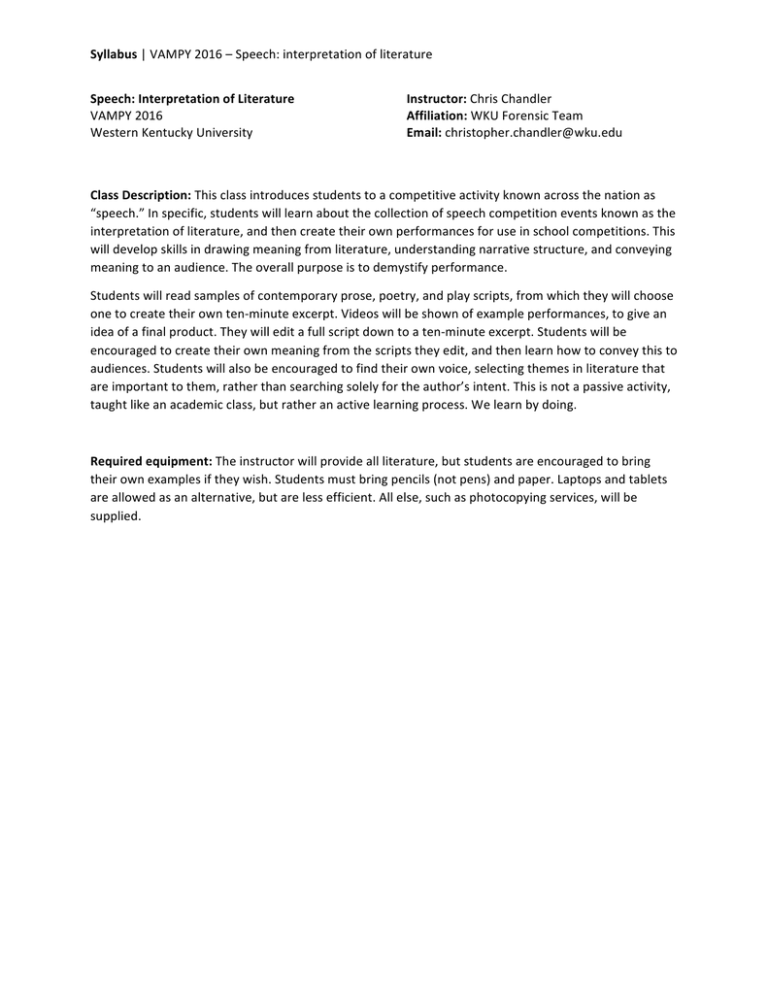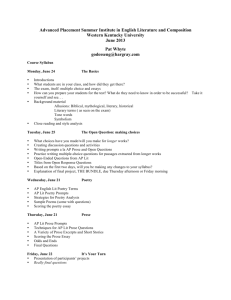Document 14463552
advertisement

Syllabus | VAMPY 2016 – Speech: interpretation of literature Speech: Interpretation of Literature VAMPY 2016 Western Kentucky University Instructor: Chris Chandler Affiliation: WKU Forensic Team Email: christopher.chandler@wku.edu Class Description: This class introduces students to a competitive activity known across the nation as “speech.” In specific, students will learn about the collection of speech competition events known as the interpretation of literature, and then create their own performances for use in school competitions. This will develop skills in drawing meaning from literature, understanding narrative structure, and conveying meaning to an audience. The overall purpose is to demystify performance. Students will read samples of contemporary prose, poetry, and play scripts, from which they will choose one to create their own ten-­‐minute excerpt. Videos will be shown of example performances, to give an idea of a final product. They will edit a full script down to a ten-­‐minute excerpt. Students will be encouraged to create their own meaning from the scripts they edit, and then learn how to convey this to audiences. Students will also be encouraged to find their own voice, selecting themes in literature that are important to them, rather than searching solely for the author’s intent. This is not a passive activity, taught like an academic class, but rather an active learning process. We learn by doing. Required equipment: The instructor will provide all literature, but students are encouraged to bring their own examples if they wish. Students must bring pencils (not pens) and paper. Laptops and tablets are allowed as an alternative, but are less efficient. All else, such as photocopying services, will be supplied. Syllabus | VAMPY 2016 – Speech: interpretation of literature DAY ONE -­‐ Monday – what is speech competition? Watch: video of a performance Lecture: Explain what speech competition is Brief survey of interpretation events o Dramatic Interpretation, Duo Interpretation, Humorous Interpretation, Poetry Interpretation, Prose Interpretation Like to make people laugh? (HI/duo) Fun with voices/faces? (HI) Prefer realism? (DI/duo/prose) Teamwork and coordination? (duo) Like telling stories? (prose/DI) Love drama? (DI/duo/poetry) DAY TWO -­‐ Tuesday – Prose/Poetry focus Watch: video of a prose and video of a poetry Lecture: “contrasting performance styles, and learn their components” • PROSE – focus on the story; tends toward relatable or natural performance • POETRY – focus on the language; tends toward evocative or spectacle performance Watch: video of another prose and video of another poetry Activity: What separated these performance styles from those watched earlier in class? Explore the ability for audiences to relate to or appreciate different types of performances. How do audiences receive different types of performance? Explore each performer’s capacity to perform each (most favor one over the other). Syllabus | VAMPY 2016 – Speech: interpretation of literature DAY THREE -­‐ Wednesday – HI/DI/Duo focus Watch: videos of two different styles of duo These can be either spectacle or natural (or both). Watch: videos of two different styles of dramatic interp These tend to be a hybrid of natural and spectacle, leaning toward natural. It’s realism that avoids also being boring. Watch: videos of two different styles of humorous interp However different from DI, HI can still be either spectacle or natural (or both), but it strongly tends to be a hybrid: too much “natural” is rarely funny, and too much “spectacle” can be equally un-­‐funny. Activity: Further explore the ability for audiences to relate to or appreciate different types of performances. How do audiences receive different types of performance? Explore each performer’s interest in each of the events explored in the previous two days. Syllabus | VAMPY 2016 – Speech: interpretation of literature DAY FOUR -­‐ Thursday – selecting a script for performance Lecture: Script analysis Contemporary/progressive lit versus traditional lit. What to do with older lit? CHARACTER(S): are they interesting? LANGUAGE/STORY: interesting language or interesting situation? CONFLICT/RESOLUTION: else the audience won’t care Activity: Find conflicts and resolutions in select movies o The Lord of the Rings; The Avengers; Star Wars: The Force Awakens; Keanu THESIS STATEMENT DAY FIVE-­‐ Friday – looking at/reading scripts Strategies for selecting scripts: Read the back cover. Too complicated? Do you get a sense of the voice in the first few pages? Then skip ahead a bit and try again to get a sense of the voice. Then skip to first few pages of last chapter, then the last page. Brief lecture: “Finding the statue in the uncut stone”: can you plan a finished script based on the original lit? Use your thesis statement as a guide 1. Choose a conflict 2. Find a satisfactory resolution 3. Work your way backwards Activity: Most of the day will be looking at and reading scripts and stories. Be courageous: discuss your ideas with us. Ask questions. We will make photocopies of multiple scripts for each student, that they may read further over the weekend. Syllabus | VAMPY 2016 – Speech: interpretation of literature DAY SIX – Monday – how to compose a cutting; read scripts Full lecture: “Finding the statue in the uncut stone”: can you plan a finished script based on the original lit? Use your thesis statement as a guide 1. Choose a conflict 2. Find a satisfactory resolution 3. Work your way backwards; what is necessary? Activity: Day two of looking through scripts DAY SEVEN – Tuesday – reviewing our plans Activity: Those who have selected scripts will discuss why you chose the script, your planned conflict, planned solution, and the story elements required to make that work. This will be interactive. DAY EIGHT – Wednesday – composing a cutting Lecture: Cutting Stage II: shaping the dramatic arc Activity: drawing our dramatic arcs DAY NINE – Thursday –cutting Activity: composing cuttings and writing introductions Syllabus | VAMPY 2016 – Speech: interpretation of literature DAY TEN – Friday – creating characters Lecture: Character analysis and construction MOTIVATION PHYSICALITY PERSONAL SPACE and FOCAL POINTS Activity: creating a pallet of characteristics DAY ELEVEN – Monday – constructing scenes Lecture: constructing a scene; the value of context LOCATION + MOOD = MEANING BLOCKING PANTOMIME: literal versus representative Activity: Taking ownership of your space DAYS TWELVE THROUGH FIFTEEN – Monday through Friday – coaching Activities: students will work on forming their characters, memorizing their cuttings, and practicing with the staff. The process will end with a showcase.

